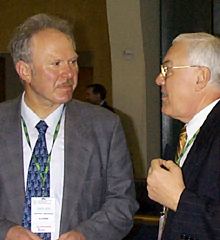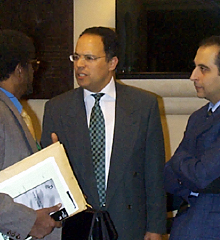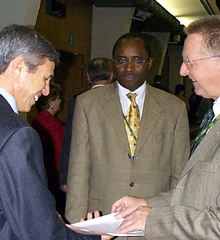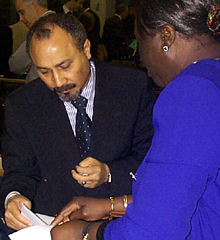|
Thursday, 13 March
Defining Work Objectives for FAO in Key Cross-Cutting Areas Identified by Countries and the FAO Medium-Term Planning Process.
Assistant Director General El-Lakany presented the proposals for work program for 2004-2005 The Medium-Term Plan (MTP) contains the four FAO forestry programmes with some modifications.
 Listen to Assistant Director General El-Lakany Listen to Assistant Director General El-Lakany
Lebanon reported that in the side event on FAO support for member countries held the previous day, participants noted a decline in field programmes, the importance of regional officers for technical assistance and of Regional Forestry Commissions in consultations and drawing up programmes for actions and priorities; the need to raise awareness among member and donors countries of the valuable contribution of FAO field programmes; the need for countries to interact with FAO; the need to simplify processes for requesting FAO assistance; and FAO's role in information dissemination and exchange.
 Listen to Lebanon Listen to Lebanon
Iran reported on consultations held the previous day in the side event on Low Forest Cover Countries (LFCCs). Discussions raised the need of the Teheran Process on LFCCs to proceed on the basis of a multidisciplinary, decentralized and participatory approach; and the Teheran Secretariat's need for continued technical support in order to highlight LFCC issues in the international level and reach out to LFCCs.
 Listen to Iran Listen to Iran
Greece, on behalf of the European Community and its member States and supported by Australia, stressed that the programme of work should be clearly focused and contain indicators for quantitative and qualitative outputs. He welcomed the FAO's entity on forests and poverty alleviation, noting that it should be mainstreamed throughout the FAO's programmes.
 Listen to Greece Listen to Greece
Australia supported the FAO's work on the IPF/IFF proposals for action; collaboration with the Collaborative Forestry Partnership; development of criteria and indicators (C&I), and trade and Sustainable Forest Management (SFM); elaboration of harmonized forest-related definitions, Forest Resources Assessments (FRAs), and economics of forests. He encouraged FAO support to Global FRAs and regional information-sharing networks; and recommended clear reference to linkages to the IPF/IFF proposals for action.
 Listen to Australia Listen to Australia
Japan and Brazil requested FAO to collaborate with existing organizations to avoid duplicating international efforts on forests, water and climate change.
 Listen to Japan Listen to Japan
The Republic of the Congo, Senegal and South Africa stressed the importance of capacity-building at the subregional level and recommended that FAO convene workshops on key aspects of SFM, including certification and management of forest fires.
 Listen to South Africa Listen to South Africa
Morocco stated that FAO should continue supporting developing countries in FRAs and development of methodologies and evaluation techniques.
Finland said FAO should: avoid duplication between its programme of work and that of the CBD, such as regarding genetic resources and forest fires; and clarify the conceptual basis of the ecosystem approach.
China said that while it supported FAO's traditional programmes it welcomed FAO's efforts to expand into the area of climate and climate change policy.
 Listen to China Listen to China
India suggested the creation of a forest sustainability index, to indicate, inter alia, carbon dioxide contribution of forests, forest health and vitality, biodiversity functions, and productive, social and economic functions. He highlighted the impact of forests on microclimates and said that the developing world requires aggressive awareness campaigns.
 Listen to India Listen to India
The US asked FAO to continue providing assistance to prevent and control forest fires with an increased emphasis on ecologically-based fire management programmes; underscored the importance of promoting the use of forests and wood products as measurable carbon sinks; encouraged emphasis on outputs under the national institutional capacities and governance program elements; called on FAO to strengthen its role as facilitator of discussions on mutual recognition and exchange of information on forest certification schemes; suggested the inclusion of reference in the COFO Report and the Medium-Term Plan to the conclusions and recommendations of the 2003 International Conference on the Contribution of C&I to SFM; and asked that the Report acknowledge that the contribution of forests to the thematic areas of the WSSD is not well recognized internationally.
 Listen to the US Listen to the US
Norway expressed hope that FAO would focus protection efforts in areas of high-level poverty and deforestation rates. Supported by Indonesia and Japan, he requested that FAO prioritize forest policy and governance issues, such as analysis of underlying causes of illegal activities and means to enhance developing countries' institutional capacities.
 Listen to Norway Listen to Norway
The International Tropical Timber Organization (ITTO) highlighted that the problems faced in the forestry sector outweigh resource availability and therefore collaboration is a necessity.
 Listen to the ITTO Listen to the ITTO
Programme Budget and Evaluation Director Tony Wade highlighted the evaluation process of programs, instituted in 2003 through periodic internal and peer group evaluation. He provided information on the increase in the forestry programmes' allocation within the overall FAO and technical programmes' budget, indicating that it weathered budget cuts.
 Listen to Tony Wade Listen to Tony Wade
Committee Chair Maragaia Perri commented on the emergence of forests and poverty alleviation and forests and food security as issues that have come to the fore at COFO. |













